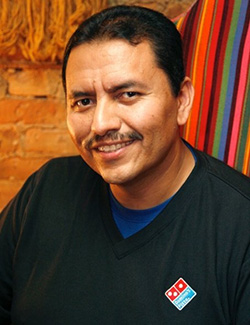 Doug Banks has seen his fair share of PR pitches – having worked at various tech publications over the years. In our continuing effort to help PR executives and journalists better understand each other, we interviewed Doug recently. From cold-weather camping with his children, to keeping the newsroom connected with Mass High Tech’s readers, Doug knows how to work hard, play hard and keep his priorities in check.
Doug Banks has seen his fair share of PR pitches – having worked at various tech publications over the years. In our continuing effort to help PR executives and journalists better understand each other, we interviewed Doug recently. From cold-weather camping with his children, to keeping the newsroom connected with Mass High Tech’s readers, Doug knows how to work hard, play hard and keep his priorities in check.
PPR: You are the Editor for Mass High Tech; how long have you been doing that and what do you find most fascinating about New England’s high tech industry?
I’ve been editor since 2005, when I came over from our sister paper, the Boston Business Journal. I started reporting in 1992, but I’ve been doing business journalism in Boston since 1998, when I joined the BBJ. I left there to go to Fast Company magazine from 2000-2001, where I got to see the highest heights of the tech industry and then one of the lowest lows (assuming we’re not at the lowest low right now). The most fascinating thing about New England’s high tech industry? Probably its ability to change, on the fly, without much notice. In barely four years, the complexion of this region’s economy has undergone seriously rapid transformation.
PPR: With all the chatter about traditional media and the PR industry dying, what are you guys doing to stay relevant, informed and connected at Mass High Tech?
Our readership is geographically and demographically niche, so we’ve been spared from some of the carnage going on nationally in journalism. But a bigger reason, I think, for our ability to not be dying, and to stay relevant, is our move last year to redesign our web site, add new industry-specific email newsletters and news digests, and get more active in the places our readers are hanging out and looking for their news. And that’s why you’ll find a better collection of RSS feeds, you’ll find us with a very active Twitter presence, and (at long last) finishing up a Facebook presence. We’re also doing more targeted things, such as launching new Linked In groups specifically for All-Stars and Women to Watch honorees to help them network with one another better.
Ultimately, it’s all about staying connected to our readers, knowing where they are and what they’re doing and reporting it in as many forms as necessary. And we’re the first to admit that we have a lot more to do.
PPR: What’s it like these days in the newsroom? What’s the most impactful change that you’ve experienced in your industry/job over the last five years?
It’s busier than ever. All newsrooms, not just ours, are so multimedia now. If you asked me 10 years ago, or even five years ago, how many reporters would have to tote video cameras around to capture video interviews while they’re doing interviews for the print edition and then for the web site, I would have thought you were crazy. Now we’re asking reporters to file information for creating online maps, mashups; we’re asking them to not only shoot video, but help edit it; we’re asking them to promote their stories on the social networks. I mean, they’re doing it all — it’s definitely different. And I will say this — it’s never boring.
PPR: It’s just warming up – what did you do to keep yourself entertained during New England’s long winter?
I love camping and I don’t let the cold stop me and my kids from enjoying the outdoors. My daughter and I love playing in the backyard snow, and my son and I recently went to Maine for an overnight camping trip. We also spent an outdoor activity day in Gardner and in January I organized an indoor overnight as part of a church-based scouting program I’m involved in. So entertainment, when you have kids, is never difficult.
PPR: Name the most interesting place you’ve ever visited.
Tough one. Most recently? Probably Bryce Canyon in Utah, in 2007. My daughter and son, 5 & 7 at the time, hiked the entire canyon, which is practically 8,000 feet above sea level. They’re hardcore.
PPR: TV, Internet or books?
I’m 30/30/30. Books in the morning when I first get up, Internet all day, TV at night to wind down.
PPR: Did you always want to be in journalism? If you weren’t an Editor, what would you be?
I always thought I wanted to be a teacher, but found that I was pretty good at digging up news, so I ended up as a reporter. And I still get to teach — I’ve been an adjunct at Emerson for a few years now and BU before that, as well as a number of community colleges when I first moved to Boston. If I weren’t an editor, I’d probably be a teacher of some kind.
PPR: What’s your favorite type of food?
Lebanese. My wife’s cooking, in particular.
PPR: What would we find on your iPod?
Podcasts? Spanish and Brazilian Portuguese language lessons; Music? R&B, soul and contemporary gospel. But mixed in with the Stevie Wonder and John Legend is some Pixies, early REM, Van Halen and U2. My tastes are eclectic.
PPR: What’s the most daring thing you’ve ever done?
This July, I’m going to Peru, up the Amazon River, with a team of people to build a school/church building for a couple of local villages there. I haven’t done it yet, so it doesn’t really answer the question, but judging from how far remote we may be going, it’s the only thing I can think of at the moment.
PPR: What three words would other people would use to describe you?
Most people I know are too wordy to use just three words. I would hope they would use words like “authentic.”
PPR: What’s one thing that would surprise people about you?
For people who only know me through work? Probably my commitment to putting family and faith first. Work is important, but it doesn’t come close to those two things.
 What is Engagement in Social Media?
What is Engagement in Social Media?



 Social Media Lessons from the Big Brands: Intuit Edition
Social Media Lessons from the Big Brands: Intuit Edition Doug Banks has seen his fair share of PR pitches – having worked at various tech publications over the years. In our continuing effort to help PR executives and journalists better understand each other, we interviewed Doug recently. From cold-weather camping with his children, to keeping the newsroom connected with Mass High Tech’s readers, Doug knows how to work hard, play hard and keep his priorities in check.
Doug Banks has seen his fair share of PR pitches – having worked at various tech publications over the years. In our continuing effort to help PR executives and journalists better understand each other, we interviewed Doug recently. From cold-weather camping with his children, to keeping the newsroom connected with Mass High Tech’s readers, Doug knows how to work hard, play hard and keep his priorities in check.